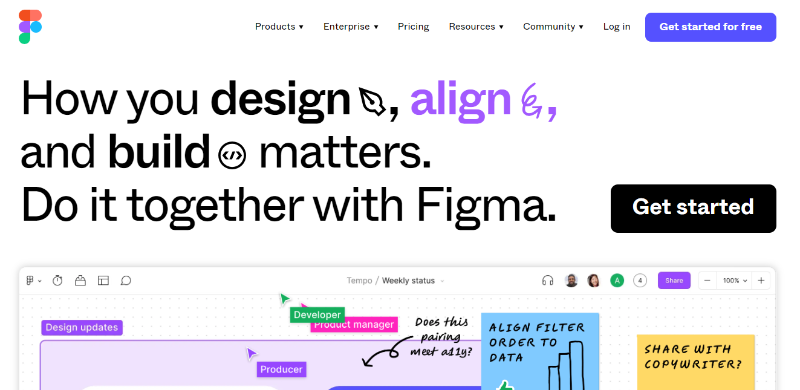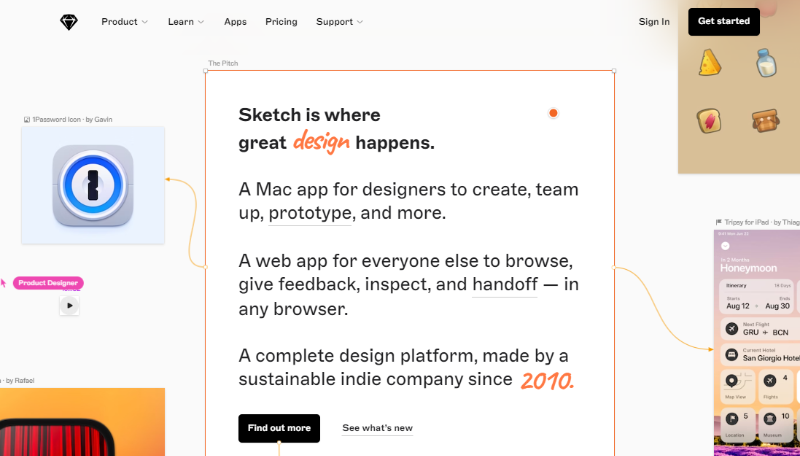Ladies and gentlemen welcome to the ultimate showdown in the world of design! In this epic Triple Threat Match, we have three heavyweight contenders ready to battle it: Figma, Adobe XD, and Sketch. These software tools have built quite a reputation and are armed with features and functionalities.
In the fast-paced and ever-changing design landscape, designers must choose the right tool to bring their creative visions to life. Each of our contenders has its strengths and weaknesses; we're here to break them down for you.
Figma
First up, we have Figma! This powerhouse brings a lot to the table. It's known for its collaborative capabilities, allowing designers to work together in real time, making it an excellent choice for team projects. Figma also boasts a web-based platform, meaning you can access your designs from anywhere with an internet connection. However, some users have found that Figma's performance can be sluggish when dealing with complex projects.

Pros
- Real-time collaboration: Figma's features for real-time collaboration enable multiple designers to work on a particular project simultaneously, promoting seamless teamwork and avoiding the need for continuous file transfers.
- Compatible Platforms: Figma is compatible with Mac and Windows operating systems because it is a browser-based application. For a more natural experience, it also provides dedicated desktop apps.
- Prototyping: Designing interactive and animated prototypes without leaving the Figma application is possible because of the application's powerful prototyping capability.
- Version History: Version history in Figma enables designers to track and manage design changes, making it simple to make adjustments and roll back as necessary.
- Developer Handoff: In Figma, handing off the design assets and specifications from designers to developers enables developers to extract crucial information and work productively together on implementing the design.
Cons
- Steeper Learning Curve: Beginners or those switching from other design tools may need more time to understand Figma's advanced functions and capability.
- Access Offline Is Limited: Although Figma's web-based format offers flexibility, accessing and working on designs require an internet connection.
- Performance: Figma occasionally experiences problems with more complicated projects, including multiple artboards or detailed designs.
Pricing
There are three price tiers available with Figma, which are Starter ($0), Professional ($12 per editor/month), and Organisation ($45 for enterprise-level functionality). Small teams or individuals can use the free plan, while the Professional offer extra features, including team libraries and complete version history, and the Organisation subscription offers private plugins, widgets, and org-wide libraries.
Adobe XD
Next in the ring, we have Adobe XD, a worthy opponent. Thanks to its seamless integration with other Adobe Creative Cloud apps, Adobe XD is a go-to tool for many designers. If you're already familiar with Adobe's suite of products, you'll feel right at home with XD. It offers a smooth user experience and powerful prototyping features. On the downside, Adobe XD's pricing can be steep, especially for individual users or small design teams.

Pros
- Effortless Integration with Adobe Products: Designers can streamline their workflows and use the same materials in several applications thanks to Adobe XD's seamless integration with other Adobe products like Photoshop and Illustrator.
- Voice Prototyping: XD is well suited for building voice-enabled interfaces since it has a special capability that lets designers build voice interactions and prototypes.
- Auto-Animate: The auto-animate function in XD makes it simple for designers to make animated and interactive transitions between artboards, improving the user experience. Without using any code or additional tools, designers can create complex animations and interactions with auto-animate.
- Designing Interface: It helps to adjust to various screen sizes, and devices are made simpler with the help of XD's responsive resizing features.
- Plugins: XD provides various plugins such as UnDraw, PhotoSplash 2, Mockplus iDoc, Color Ranger Pro 2, and UI kits that enhance functionality and add more design options.
Cons
- Collaboration Limitations: Collaboration tools offered by XD are not as extensive as those provided by Figma, with restrictions on simultaneous editing and real-time collaboration.
- Platform Restrictions: XD doesn't yet have a web-based version and is only accessible for Mac and Windows.
- Performance Problems: Working on complex projects with many artboards might occasionally lead to slower performance because XD can be resource-intensive.
Pricing
Adobe XD offers a free plan with restricted capabilities appropriate for beginners or freelance designers. The XD Single App subscription option costs $9.99 monthly, adding more capabilities like unlimited design assets and co-editing. The Adobe Creative Cloud All Apps membership also includes access to it.
Sketch
Last, we have Sketch, a long-standing favorite among designers. Sketch is known for its intuitive interface and ease of use. It offers a wide range of plugins and extensions, allowing you to customize your workflow. Sketch also has a strong community support system with a vast library of resources and tutorials. However, remember that Sketch is only available for MacOS, which could be a deal breaker if you use a different operating system.

Pros
- Mac-Focused Design: Sketch is tailored for Mac, utilizing native Mac features to provide users with a seamless and easy-to-operate experience.
- Vector Editing: Sketch excels at vector editing, making it simple for designers to produce accurate and scalable designs.
- Plugins and Libraries: The design community has produced many plugins and UI kits for Sketch, increasing its capabilities and offering enormous resources.
- Exporting Assets: Sketch makes it easier for developers to export design assets by creating a variety of formats and resolutions in a matter of clicks.
- Integrations with Other Programmes: Sketch works well with other programs like Zeplin, Abstract, and InVision, enabling a seamless handoff and engagement between customers and developers.
- Available offline: Sketch's offline feature offers designers freedom and convenience who prefer an independently operated design tool without an online connection.
Cons
- Collaboration Issues: Compared to Figma and XD, Sketch has fewer collaboration tools, making it less effective for working in big teams or in real-time.
- Limited Platform Compatibility: Since Sketch is only available for Mac users, designers using other platforms cannot use it.
- Prototyping Capabilities: Sketch has some basic prototyping options, although they are not as robust or sophisticated as those offered by Figma and XD.
Pricing Plans
Sketch has a subscription-based pricing plan that costs $10 per contributor every month. The business plan costs $20 per editor every month, and with a Mac-only license, it costs you $120. Regular upgrades and access to the Sketch Cloud collaboration platform are also included in the subscription.
Conclusion
You can choose the correct design tool based on your individual design goals, team communication needs, platform preferences, and financial constraints. Figma is the perfect tool for teams working together across several operating systems because of its collaboration and platform compatibility strengths.
When compared to Sketch, which offers a native Mac experience and strong vector editing skills, Adobe XD connects effectively with the Adobe ecosystem and adds voice prototyping features.
Making an informed selection based on your unique needs will be easier if you carefully consider the advantages and disadvantages mentioned in this blog. Whichever tool you select, these three design tools have revolutionized the field and enabled designers to produce outstanding user experiences and execute their ideas.



